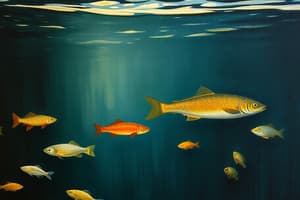Podcast
Questions and Answers
Complete the table about feeding relationships.
Complete the table about feeding relationships.
N/A
What is a food chain?
What is a food chain?
A series of steps in which organisms transfer energy by eating and being eaten.
What is a food web?
What is a food web?
A feeding relationship that is much more complicated than the relationship described in a single, simple chain.
Draw arrows between the organisms to show how energy moves through this food chain. Write producer, herbivore, or carnivore under each organism.
Draw arrows between the organisms to show how energy moves through this food chain. Write producer, herbivore, or carnivore under each organism.
What is the classification of the following organisms: squid, shrimp, shark?
What is the classification of the following organisms: squid, shrimp, shark?
How does energy flow through this food chain?
How does energy flow through this food chain?
What would happen to this food chain if a disturbance caused a serious decline in the shark population?
What would happen to this food chain if a disturbance caused a serious decline in the shark population?
What role does energy play in the ecosystem diagram?
What role does energy play in the ecosystem diagram?
Primary consumers always make up the first trophic level in a food web.
Primary consumers always make up the first trophic level in a food web.
Ecological pyramids show the relative amount of energy or matter contained within each trophic level in a given food web.
Ecological pyramids show the relative amount of energy or matter contained within each trophic level in a given food web.
On average, about 50 percent of the energy available within one trophic level is transferred to the next trophic level.
On average, about 50 percent of the energy available within one trophic level is transferred to the next trophic level.
The more levels that exist between a producer and a given consumer, the larger the percentage of the original energy from producers is available to that consumer.
The more levels that exist between a producer and a given consumer, the larger the percentage of the original energy from producers is available to that consumer.
What is algae classified as?
What is algae classified as?
What is a grasshopper classified as?
What is a grasshopper classified as?
What is marsh grass classified as?
What is marsh grass classified as?
What is a marsh hawk classified as?
What is a marsh hawk classified as?
What is plankton-eating fish classified as?
What is plankton-eating fish classified as?
What is ribbed mussel classified as?
What is ribbed mussel classified as?
What is shrew classified as?
What is shrew classified as?
What is zooplankton classified as?
What is zooplankton classified as?
Complete the energy pyramid by writing the source of the energy for the food web and how much energy is available to first, second, and third-level consumers.
Complete the energy pyramid by writing the source of the energy for the food web and how much energy is available to first, second, and third-level consumers.
What is the energy source in ecosystems?
What is the energy source in ecosystems?
What percentage of energy do first-level consumers receive?
What percentage of energy do first-level consumers receive?
What percentage of energy do second-level consumers receive?
What percentage of energy do second-level consumers receive?
What percentage of energy do third-level consumers receive?
What percentage of energy do third-level consumers receive?
A pyramid of _____ illustrates the relative amount of living organic matter available at each trophic level in an ecosystem.
A pyramid of _____ illustrates the relative amount of living organic matter available at each trophic level in an ecosystem.
A pyramid of _____ shows the relative numbers of individual organisms at the trophic levels in an ecosystem.
A pyramid of _____ shows the relative numbers of individual organisms at the trophic levels in an ecosystem.
A pyramid of _____ shows the relative amounts of energy available at the trophic levels of a food chain or food web.
A pyramid of _____ shows the relative amounts of energy available at the trophic levels of a food chain or food web.
What type of ecological pyramid best traces the flow of matter through an ecosystem?
What type of ecological pyramid best traces the flow of matter through an ecosystem?
Flashcards
Food Chain
Food Chain
A series of steps in which organisms transfer energy by eating and being eaten.
Food Web
Food Web
A feeding relationship that is more complex than a food chain.
Producer
Producer
Organism that produces its own food, often through photosynthesis.
Herbivore
Herbivore
Signup and view all the flashcards
Carnivore
Carnivore
Signup and view all the flashcards
Squid
Squid
Signup and view all the flashcards
Shrimp
Shrimp
Signup and view all the flashcards
Shark
Shark
Signup and view all the flashcards
Energy Flow
Energy Flow
Signup and view all the flashcards
Trophic Level
Trophic Level
Signup and view all the flashcards
Primary Consumer
Primary Consumer
Signup and view all the flashcards
Second-level consumer
Second-level consumer
Signup and view all the flashcards
Third-level consumer
Third-level consumer
Signup and view all the flashcards
Algae
Algae
Signup and view all the flashcards
Grasshopper
Grasshopper
Signup and view all the flashcards
Marsh Grass
Marsh Grass
Signup and view all the flashcards
Marsh Hawk
Marsh Hawk
Signup and view all the flashcards
Plankton-eating fish
Plankton-eating fish
Signup and view all the flashcards
Ribbed Mussel
Ribbed Mussel
Signup and view all the flashcards
Shrew
Shrew
Signup and view all the flashcards
Zooplankton
Zooplankton
Signup and view all the flashcards
Ecological Pyramid
Ecological Pyramid
Signup and view all the flashcards
Energy Pyramid
Energy Pyramid
Signup and view all the flashcards
Pyramid of Biomass
Pyramid of Biomass
Signup and view all the flashcards
Pyramid of Numbers
Pyramid of Numbers
Signup and view all the flashcards
Energy Source
Energy Source
Signup and view all the flashcards
Energy Percentage (1st level)
Energy Percentage (1st level)
Signup and view all the flashcards
Energy Percentage (2nd level)
Energy Percentage (2nd level)
Signup and view all the flashcards
Energy Percentage (3rd level)
Energy Percentage (3rd level)
Signup and view all the flashcards
Study Notes
Feeding Relationships
- Food chains depict the linear transfer of energy from one organism to another through consumption.
- Food webs illustrate complex interactions among multiple food chains, showcasing a network of feeding relationships.
Energy Flow in Food Chains
- Energy flow begins with producers, who convert light or chemical energy into usable forms.
- Consumers—herbivores and carnivores—derive their energy by eating producers or other consumers, respectively.
- Decomposers recycle nutrients from dead organisms, facilitating nutrient availability for primary producers.
Impact of Disturbances
- A decline in predator populations (e.g., sharks) can lead to overpopulation of prey species (e.g., fish), resulting in decreased populations of their food sources (e.g., shrimp and algae).
Trophic Levels and Energy Transfer
- Primary consumers are confirmed to be the first in any food web.
- Ecological pyramids represent energy amounts or biomass at each trophic level.
- Only about 10% of energy from one trophic level is passed to the next, with diminishing returns as you move up levels (e.g., 10% to first-level consumers, 1% to second-level, 0.1% to third-level).
Types of Ecological Pyramids
- Pyramid of biomass displays the amount of living organic material at each trophic level.
- Pyramid of numbers depicts the number of individual organisms existing at each level.
- Pyramid of energy shows the flow and quantities of energy available at different levels, indicating inefficiencies in energy transfer.
Key Organisms in Ecosystems
- Algae and marsh grass serve as primary producers.
- Grasshoppers, ribbed mussels, zooplankton, and shrews are identified as first and second-level consumers.
- Marsh hawks are classified as third-level consumers, indicating their position as predators in the ecosystem.
Energy Sources
- Primary energy sources include light (solar) and chemical energy, fundamental for the sustenance of ecosystems.
Studying That Suits You
Use AI to generate personalized quizzes and flashcards to suit your learning preferences.




